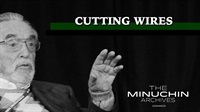
- Topic Areas:
- Family Therapy | Family Therapy: Families with Children
- Bundle(s):
- The Minuchin Archives - Style of the Family Therapist - Full Set
- Categories:
- The Minuchin Archives
- Duration:
- 50 Minutes
- Format:
- Audio and Video
- Short Description:
- In this session, Dr. Minuchin consults with a family consisting of a mother, father, and a 15-year-old son who is in treatment for depression. The session focuses on shifting the family’s sense of belonging to allow son to begin to become more autonomous. The social worker of the son’s treatment unit sits in on the session.
- Price:
- $19.95 - Base Price

- Topic Areas:
- Working with Welfare Families
- Bundle(s):
- The Minuchin Archives - Style of the Family Therapist - Full Set
- Categories:
- The Minuchin Archives
- Duration:
- 30 Minutes
- Format:
- Audio and Video
- Short Description:
- This series of sessions showcases Dr. Minuchin’s involvement with children from a homeless family. Dr, Minuchin meets with the family with the goal to empower this family. The family treats Minuchin with a paradoxical combination of openness, suspicion, and passivity. This paradoxical posture is one that the family has learned to assume in response to the constant and uncontrolled entrance and exit of multiple helpers into their lives.
- Price:
- $9.95 - Base Price
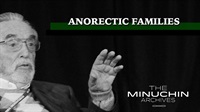
- Topic Areas:
- Family Therapy | Family Therapy: Families with Children
- Bundle(s):
- The Minuchin Archives - Style of the Family Therapist - Full Set
- Categories:
- The Minuchin Archives
- Duration:
- 35 Minutes
- Format:
- Audio and Video
- Short Description:
- A session with Dr. Minuchin as he works with an Italian immigrant family with five children. The family began therapy as the daughter, 16, was diagnosed with anorexia two years previously and the symptoms were still present. From the first moments of the session, the mother’s undisputed power emerges, leading to a polemic between belonging and autonomy.
- Price:
- $9.95 - Base Price
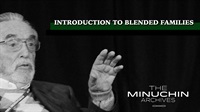
- Topic Areas:
- Family Therapy | Family Therapy: Blended Families
- Bundle(s):
- The Minuchin Archives - Style of the Family Therapist - Full Set
- Categories:
- The Minuchin Archives
- Duration:
- 1 Minutes
- Format:
- Audio and Video
- Short Description:
- A written introduction to the topic of blended families. The difference in subsystems is described, as well as the effect these can have on a family.
- Price:
- $1.95 - Base Price

- Topic Areas:
- Disempowering Families | Family Therapy | Family Therapy: Families with Children
- Bundle(s):
- The Minuchin Archives - Style of the Family Therapist - Full Set
- Categories:
- The Minuchin Archives
- Duration:
- 56 Minutes
- Format:
- Audio and Video
- Short Description:
- This session with Dr. Minuchin is with the family of a 12-year-old boy who has been hospitalized in a psychiatric unit for children. There are two disturbed systems that Dr. Minuchin addresses in this session. One is the family who needs to change. The other is the psychiatric unit where the child is hospitalized, that in hopes will be perturbed by the intervention.
- Price:
- $19.95 - Base Price
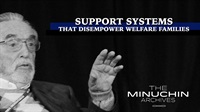
- Topic Areas:
- Working with Welfare Families
- Bundle(s):
- The Minuchin Archives - Style of the Family Therapist - Full Set
- Categories:
- The Minuchin Archives
- Duration:
- 8 Minutes
- Format:
- Audio and Video
- Short Description:
- Dr. Minuchin presents segments from three cases involving families who were receiving social services provided by government agencies. In these segments we will see how the entrance of well meaning helpers into these families serves to disempower rather than empower the parents, and further disrupts the effective functioning of the family unit.
- Price:
- $2.95 - Base Price
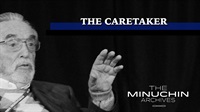
- Topic Areas:
- Working with Welfare Families
- Bundle(s):
- The Minuchin Archives - Style of the Family Therapist - Full Set
- Categories:
- The Minuchin Archives
- Duration:
- 26 Minutes
- Format:
- Audio and Video
- Short Description:
- In this session, Dr. Minuchin works with a couple who has two children, both of whom are in foster care. This case demonstrates ways in which the involvement of multiple systems of care can cause disorganization in a family, if the systems themselves fail to work in sync. In this case, we meet a mother who struggles with drug addiction, which has impacted her ability to care for her children and family.
- Price:
- $9.95 - Base Price
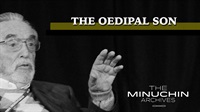
- Topic Areas:
- Supervision
- Bundle(s):
- The Minuchin Archives - Style of the Family Therapist - Full Set
- Categories:
- The Minuchin Archives
- Duration:
- 45 Minutes
- Format:
- Audio and Video
- Short Description:
- A young man and his family enter a consultation session after the issue was raised of their son “rubbing his eyes”. The issue being that the young man had recently left a psychiatric hospital for attempting to gouge out his own eye. The intense involvement between mother and son is the matrix within which the son’s obsessive compulsive symptomatology has risen. The fathers evident disengagement from mother and son supports and maintains the over involvement between the young man and his mother.
- Price:
- $19.95 - Base Price
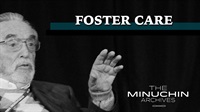
- Topic Areas:
- Foster Care
- Bundle(s):
- The Minuchin Archives - Style of the Family Therapist - Full Set
- Categories:
- The Minuchin Archives
- Duration:
- 38 Minutes
- Format:
- Audio and Video
- Short Description:
- In the 1990s Dr. Minuchin conceived and led a project to demonstrate a different way to conceptualize and practice foster care. Dr Minuchin envisioned this new system where the agency would allow and encourage the two families to function as they expanded their work on behalf of the child - sharing information and solving problems together. The core strategy of Dr. Minuchin’s project was to capitalize on the natural talents of experienced foster parents, who often go beyond what is required of them by the agencies, and find ways to help the natural parents maintain and develop their relationship with their children during the time their children are in foster care.
- Price:
- $19.95 - Base Price
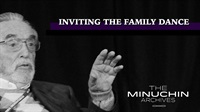
- Topic Areas:
- Inviting the Family Dance
- Bundle(s):
- The Minuchin Archives - Style of the Family Therapist - Full Set
- Categories:
- The Minuchin Archives
- Duration:
- 1 Hour 5 Minutes
- Format:
- Audio and Video
- Short Description:
- A documentary with a series of interviews, sessions and clinics that explores the life of Dr. Salvador Minuchin, his extensive work in family therapy and his development of style.
- Price:
- $19.95 - Base Price
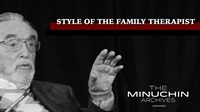
- Topic Areas:
- Style of the Family Therapist
- Bundle(s):
- The Minuchin Archives - Style of the Family Therapist - Full Set
- Categories:
- The Minuchin Archives
- Duration:
- 2 Hours 35 Minutes
- Format:
- Audio and Video
- Short Description:
- The Challenging Certainties collection features the only three remaining tapes of the 1982 Philadelphia Child Guidance Clinic featuring Carl Whitaker, Virginia Satir, and Dr. Minuchin as they develop their idiosyncratic styles as family therapists. Two of the sessions feature the same family, of a boy who attempted suicide, seen by Salvador Minuchin the first day and by Carl Whitaker the next day. The third tape is of Virginia Satir’s session with a case of two divorced parents mediating the custody of their son. 
- Price:
- $39.95 - Base Price

- Topic Areas:
- Disempowering Families | Family Therapy | Family Therapy: Families with Children
- Bundle(s):
- The Minuchin Archives - Style of the Family Therapist - Full Set
- Categories:
- The Minuchin Archives
- Duration:
- 42 Minutes
- Format:
- Audio and Video
- Short Description:
- Dr. Minuchin consults with the family of a 12 year old boy, who had been institutionalized for regressive behaviors, including an overwhelming fear of ghosts. Dr. Minuchin recommends changes to the family’s organization, so that the child can return home and maintain age appropriate behaviors.
- Price:
- $19.95 - Base Price
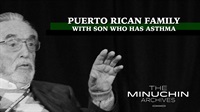
- Topic Areas:
- Family Therapy | Family Therapy: Blended Families | Family Therapy: Families with Children
- Bundle(s):
- The Minuchin Archives - Style of the Family Therapist - Full Set
- Categories:
- The Minuchin Archives
- Duration:
- 43 Minutes
- Format:
- Audio and Video
- Short Description:
- This is a blended family in formation in which they are still in a period where there are two subsystems, mother and children and new husband and wife. Joey, the IP, has serious asthma and epilepsy and has behavioral problems at school. Dr. Minuchin works in the direction of creating a new subsystem that includes the spouse of the mother as the father in the family.
- Price:
- $19.95 - Base Price
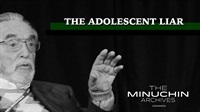
- Topic Areas:
- Family Therapy | Family Therapy: Blended Families | Family Therapy: Families with Children
- Bundle(s):
- The Minuchin Archives - Style of the Family Therapist - Full Set
- Categories:
- The Minuchin Archives
- Duration:
- 59 Minutes
- Format:
- Audio and Video
- Short Description:
- Dr. Salvador Minuchin works with a step family seeking assistance with their daughter’s habitual lying. Dr. Minuchin initiates a challenge to the family certainty that the symptom was the daughter’s lying. The shift from daughters as a carrier of lying to the father’s control over the daughter will change through the session, moving to the parent’s control and then to the mother’s control.
- Price:
- $19.95 - Base Price
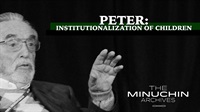
- Topic Areas:
- Disempowering Families | Family Therapy | Family Therapy: Families with Children
- Bundle(s):
- The Minuchin Archives - Style of the Family Therapist - Full Set
- Categories:
- The Minuchin Archives
- Duration:
- 40 Minutes
- Format:
- Audio and Video
- Short Description:
- In 1992, Dr. Salvador Minuchin was invited to consult with a team of mental health professionals involved in the treatment of a 9 year old boy who had been institutionalized for 2 years in psychiatric hospitals. In this video, Dr. Minuchin asserts that the identity of young children is directly connected to their belonging to a group of people, specifically their family, who have created the child’s sense of reality.
- Price:
- $19.95 - Base Price

- Topic Areas:
- Style of the Family Therapist
- Bundle(s):
- The Minuchin Archives - Style of the Family Therapist - Full Set
- Categories:
- The Minuchin Archives
- Duration:
- 58 Minutes
- Format:
- Audio and Video
- Short Description:
- Discussion with Salvador Minuchin and Jeff Zeig about fundamentals of structural famiy therapy. Includes personal tribute to Patricia Minuchin and orientation to the Minuchin Archives.
- Price:
- $19.95 - Base Price

- Topic Areas:
- Not Available
- Bundle(s):
- The Minuchin Archives - Style of the Family Therapist - Full Set
- Categories:
- The Minuchin Archives
- Duration:
- 46 Minutes
- Format:
- Audio and Video
- Short Description:
- Dr. Minuchin’s supervision of Wai-Yung Lee in her sessions with a family consisting of a father, mother, and two young men. The youngest was born with down-syndrome, and has recently shared his displeasure with the family by smearing feces in the bathroom.. Wai-Yung Lee follows up from their supervision 25 years later to reflect on the transformation of her style as a family therapist based on Minuchin’s supervision.
- Price:
- $19.95 - Base Price
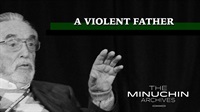
- Topic Areas:
- Family Therapy | Family Therapy: Families with Children
- Bundle(s):
- The Minuchin Archives - Style of the Family Therapist - Full Set
- Categories:
- The Minuchin Archives
- Duration:
- 1 Hour 21 Minutes
- Format:
- Audio and Video
- Short Description:
- A family presents their 17-year-old daughter who attempted suicide to Dr. Minuchin. Minuchin discovers from the father that he and his wife have been psychologically divorced since the birth of the daughter, and the mother states that she still feels single. Exploring the spouse and parental subsystems gives a map of the family. Minuchin attempts to construct an alternative family organization in which the adolescent children form a healing subsystem.
- Price:
- $19.95 - Base Price

